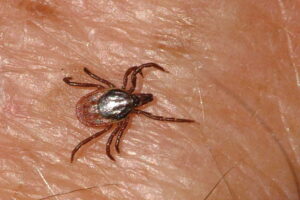
To explore the possible association, Žákovská and colleagues from Masaryk University in the Czech Republic conducted a pilot study using an in vitro method. Blood from volunteers was placed on the perimeter of filter paper placed on a Petri dish.
Researchers collected 100 nymphal Ixodes ricinus ticks in Ruda, near the Brno Reservoir. These are the most common species of ticks in Europe and the Czech Republic. They are also the primary carrier of Borrelia burgdorferi, the bacteria which causes Lyme disease.

Tick behavior was monitored at 1 and 2 minute intervals to determine which drop of blood they preferred.
“It can be stated that the most statistically preferred was blood group A, followed by the second groups – O and AB,” writes Žákovská. Type B blood was the least preferred blood group.
The findings need to be replicated in an in vivo study, given that other factors could influence the ticks’ feeding preferences in a living organism, the authors explain. However, “we cannot use model animals,” writes Žákovská, “because different animal species have different systems of blood groups.”
Studies on mosquitoes have shown preferences for certain blood types, according to a literature review by the authors. These studies used human volunteers.
“In one case, they allowed the mosquitoes to feed on the exposed hands of volunteers,” explains Žákovská. “In the second study, the experimenters were studying only ‘landing’ preferences of mosquitoes with amputated proboscis.”
[bctt tweet=”People with Blood Type A should be wary of ticks. Study shows ticks prefer Type A blood.” username=”DrDanielCameron”]
So, what about using human volunteers? Unfortunately, “this approach involves increased risk of contracting a tick-borne infection,” writes Žákovská.
Or, the authors suggest “amputate the proboscis of the vector and/or use ticks which have been both bred and kept from eggs in sterile conditions to avoid the risk of carrying infectious agents.”
The study’s authors conclude that “blood group might be one of the factors determining the feeding preferences of Ixodes ricinus ticks.” And they warn, “people with the risk blood type A should take appropriate measures to protect themselves more effectively, and decrease the risk of contracting dangerous zoonotic diseases transmitted by ticks.”
Article updated: June 4, 2019
Related Articles:
People re-infected with Lyme disease may develop strain-specific immunity
Study identifies ticks that are most dangerous to humans
References:
- Zakovska A, Janecek J, Nejezchlebova H, Kucerova HL. Pilot study of Ixodes ricinus ticks preference for human ABO blood groups using a simple in vitro method. Ann Agric Environ Med. 2018;25(2):326-328.



Very interesting maybe this also needs to be considered; different pathogens the ticks harbour might make them go for different blood groups again as we know in humans certain bacteria can change human behaviour / tendencies for example to consume high amounts of sugars to sustain the specific pathogen I’m just saying it could also be infection driven like the above example!
Im B positive and i have chronic Lyme, co infections, and mycoplasma . So, not sure how they came up with this.
I have contacted Lyme disease and I am or negative blood group. I’ve always been susceptible to bites and attracting insects. I’ve always thought it was my blood that attracted them
Wow Dave, me too! I have Rh A- blood. I was bit twice last year as I slept by two different Black Widows eight months apart. I was bit in 1992 by an infected tick, but everyone else had no ticks on them.
Two years ago I went to Bodega Bay and I stayed on paths and near the vehicle when we pulled off the road for a nature break. I started to knock down the sparse tall grass, my husband just shook his head like I was crazy.
Well on the way home I found a tick climbing up on my leg. I put sticky traps under my front and back door.
I know there are a lot of us who attract bugs.
Same for me.
I am A- and was diagnosed with Lyme in 2013. I was bit a second time in 2016. Both times with bulls-eye.
My daughter also A- was bit in 2013. 3 cousins go out exploring on a farm in Seaton TX and one gets bit. Blues Eye rash but I didn’t know what it was at the time.
I am b positive and have already had three ticks just this year and am the only one in my family, fleas also like me and all bugs that feed on blood, it’s me and my oldest son and I have 5 kids
I am O negative and also have had 3 ticks so far this year. Mosquitoes love me. 🙁
I am type A and not surprised that ticks favor that blood type. I have had Lyme and co-infections at least 3x. The ticks love me and not my husband who is not type A. I’ve always assumed they liked my blood better than his, so maybe they are on to something with this blood type theory. For those with type B that have had Lyme, maybe there was no type A blood around???
Sad to say I can’t remember my blood type, but do know my RH factor is negative. Mosquitos have always loved to bite me, and many ticks in my life as well. I’ve been very sick since the bite a year ago, but the more I have to learn with no medical help, I know this isn’t my 1st rodeo with symptoms of Lyme and coinfections.
I’m blood type O and never been bitten by ticks. I’ve spent a lot of time in the woods in the military. Have had them on me but never bitten.
The is evidence that individuals with type O blood are at risk of Malaria from a bite. The blog referred to a single study in a test where ticks were more likely to head in the direction of a drop of type A blood. It is certainly not clear if tick prefer a blood type. The authors findings might encourage further research.
So genetics being what they are, many “A-s” may be a mixed A with either an O parent or also be Duffy negative (resistance to malaria) which may make them less appealing to mosquitos, ticks, etc.
B type got bit a month ago for the first time (to my knowledge) Extracted it 24 hours after the bite
Instead of blood types maybe it’s the soaps my husband uses ivory and gets ticks all the time I use Fragrance saops, I find ticks on me but not attached, and since I’ve gotten older they don’t bite me as aften as my dogs or husband, he’s a diabetic maybe it’s something in the blood or something that you eat.
Anyone tested positive for anaplasmosis ??? And long term effects?
I find this very interesting as I am attractive to ticks! So is my father and so is one of my three sons. I believe we must all be the same blood group and I am A negative. Midges love me but not so much mosquitoes.
Damn. Im b+ and ticks have bitten me at least thousand times so far (I spend a lot of my time in nature). Never got anything. But my doctor friend said that I probably got infected as a kid and have immunity to Lyme. Never got any symptoms so far and I’m generally in great health. So I dunno.
I am not convinced that one acquires immunity. Every year, I have patients in my practice who thought they were immune.
I’m blood type B and I never get bitten! I’ve been on many camping trips with friends and I’m always that one guy laying in the bushes or plopped down in the dirt but I will always somehow be the one person who doesn’t have a bite.
Same here, have had them crawling on me but never bitten.
I Have O+ blood. I live in the very wooded mountains of Colorado. 8700′ elevation. Lots of ticks. Living in this region my entire 39 years…never once had a tick. Even lived outdoors (backwoods camping and cabin stays) for a year.
The entomology community is still working on identifying ticks in each region.
I am 29 years old and have played in the woods my whole childhood and live on 20 acres of dense woods that’s full of ticks. I have yet to have a tick bite me. I have had them land on me and crawl on me for a bit but then jump off. My fiancé on the other hand gets ticks all over him. Idk his blood type but mine is -O with the protien that helps those with sickle cell. I have also played in poison ivy and never had a reaction.
The research stems from work with Malaria. It is not clear if blood type is a factor in illness.